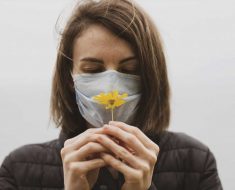Billy Connolly discusses his struggles with alcoholism
We use your sign-up to provide content in ways you’ve consented to and to improve our understanding of you. This may include adverts from us and 3rd parties based on our understanding. You can unsubscribe at any time. More info
As more of the tissue within the liver forms into scar tissue, and the organ loses its full capability of cleansing the blood, warning signs start to emerge. If you have been drinking alcohol consistently over many years, a possible early indication of liver disease is a feeling of discomfort. The British Liver Trust elaborates, adding that the discomfort would be felt in the “upper right side of your tummy” – where the liver is located.
Moreover, some people might describe the sensation as an “aching feeling”.
A damaged liver could also lead to an overwhelming sense of fatigue and nausea (i.e. feeling sick).
The disease could also make you feel generally unwell, not to mention leading to insomnia and diarrhoea.
Five “early” sensations of a scared and struggling liver:
- Discomfort in the upper right side of the stomach
- Little to no appetite
- Fatigue
- Nausea
- Feeling unwell.
READ MORE: Vision loss: Four foods that can lead to ‘total blindness’ – expert issues grave warning

As the condition progresses, you are advised to seek urgent medical advice if you experience any of the following signs:
- Yellowing of the skin and whites of the eyes (jaundice)
- Tummy (abdominal) pains over the liver area
- Itching
- Losing a lot of weight for no reason
- Weakness and wasting of your muscles
- Swelling in the legs, ankles and feet caused by a build-up of fluid
- Swelling in your tummy caused by a build-up of fluid
- A tendency to bleed and bruise more easily, such as frequent nosebleeds and bleeding gums
- Periods of confusion, forgetting things, mood changes or poor judgement.
When in the initial stages, fatty liver disease may be picked up during tests for other health issues.
If your doctor suspects liver disease, be prepared to give blood samples and to have scans.
“If your symptoms or blood tests suggest alcohol-related liver disease you might need further tests to measure how scarred your liver has become,” the charity adds.
DON’T MISS
Dementia: The smelly warning sign of dementia [ADVICE]
Cancer: The herbal supplement found to be cancerous [INSIGHT]
Fatty liver: The sweetener known to cause scarring [TIPS]

“It’s important to give your doctor as much information as you can. This will help them to diagnose your condition correctly and give you the right care.”
Should alcohol-related liver disease only be diagnosed at the later stages, there’s a risk that the damage is irreversible.
Fibrosis liver scarring
Medical staff will grade the liver damage on a scale of one to four (with the latter indicating more severe scarring).
In the early to moderate stages, you can prevent further damage – and can allow the liver to heal – by not drinking any more alcohol.
If you are struggling to abstain from alcohol, do seek the support of your doctor.
Should you be dependent on alcohol, you may experience withdrawal symptoms if you suddenly stop drinking.
If this is the case for you, your doctor may advise you to cut down your alcohol consumption, instead of abstinence.
“Reducing the amount of alcohol you drink can still lead to a significant improvement in your condition,” the British Liver Trust adds.

“You might be offered medication and psychological therapy, such as cognitive behavioural therapy (CBT), to help you through the withdrawal process.”
For those who have an extremely damaged liver, you might require a liver transplant.
“To be eligible you must have stopped drinking completely,” the charity states.
“Once you’ve had a transplant you’ll need lifelong treatment with medication to control your immune system.”
Source: Read Full Article





